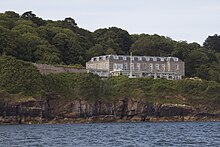Henry Francis Lyte
Henry Francis Lyte (born June 1, 1793 in Ednam , † November 20, 1847 in Nice ) was a Scottish Anglican pastor , theologian and hymn poet .
Life
Lyte was born in Scotland as the son of naval officer Thomas Lyte and his wife Anna Maria . Due to the father's occupation, the family had to move frequently, the last time to Ballyshannon in Ireland in 1804 . His father was killed in the war against Napoleon . Shortly afterwards Anna Maria also died. Lyte and his siblings were orphaned . The local pastor Robert Burrows took care of them. He sent Lyte and his older brother Tom to Portora Royal School in Enniskillen .
In 1809 Henry Lyte moved to Dublin and studied medicine at Trinity College . However, after he won several prizes for poetry and literature, faith played an increasingly important role for him, so he decided to study theology . Lyte became a deacon in 1814 and a priest the next year. In the same year 1815 he moved to Taghmon and accepted a position as vicar . In the spring of 1816 Lyte came from his annual trip for health reasons not back to Ireland, but to the south of England and became a clergyman of the Church of England . In 1817 he received the parish office in Morazion . There he met Anne Maxwell , whom he married two years later. Together they moved first to Lymington and later to South Dittisham . Their daughter died in infancy , which is why they moved to London.
In 1823 they moved one last time, to Brixham , a fishing village. Thanks to an inheritance, Lyte was able to pay off debts and lived in Brixham until his death. There he wrote many hymns for the residents, many of which are still in English hymn books today. He spent the winters in Tyrol , Switzerland , Italy and the south of France to relax for his duties in Brixham. In 1847 he was diagnosed with tuberculosis . On September 4, 1847, he gave his farewell sermon. In the afternoon he went for a walk on the beach and wrote his most famous hymn, Abide with me .
Then he went to Italy for a cure. Lyte spent the summer of 1847 at Berry Head Hotel and, after giving a final sermon to his congregation on the subject of Holy Communion, traveled to Italy again. On the trip, his lungs failed in a French hotel. Lyte died two days later. On November 22, 1847, Henry Francis Lyte was buried in the Nice Cemetery.
Abide with me
Lyte's text Abide with me with a melody by William Henry Monk ( ) is familiar to every British as an evening and death song . It can be heard at funerals and other occasions of the royal family, at the military commemorations of the Festival of Remembrance in the Royal Albert Hall and ANZAC Day , but also every year at the start of the FA Cup final and in numerous movie scenes.
The German hymns Stay with me, Lord ( Evangelical Hymnal 488 and Reformed Hymnal 603), Stay with us, Lord ( Praise of God 94) and Stay with us (Praise of God 325) are sung according to Monk's melody. The former is a paraphrase of five verses the Lyte'schen original text by Theodor Werner (1952).
Works (selection)
- Observations on the scriptures, suited to the present juncture: In an sermon preached at St. Mary's Chapel, Penzanze (1820)
- Poems: Chiefly Religious (London 1833)
- The Spirit of the Psalms (London 1834)
- Abide with me (1847)
- Praise my Soul, the King of Heaven (1834)
- God of Mercy, God of Grace (1834)
- Pleasant are Thy Courts Alone (1834)
- Manual of Devotion (Prayer Book for Fishermen)
Literature (selection)
- Ronny Baier: Henry Francis Lyte. In: Biographisch-Bibliographisches Kirchenlexikon (BBKL). Volume 29, Bautz, Nordhausen 2008, ISBN 978-3-88309-452-6 , Sp. 884 to 888.
- John D. Julian: Dictionary of Hymnology: Origin and History of Christian Hymns and Hymnwriters of All Ages and Nations, Together with Biographical and Critical Notices of Their Authors and Translators (London 1892)
- BG Skinner: Henry Francis Lyte: Brixham's poet and priest (Exeter 1974)
Individual evidence
- ↑ text
- ↑ YouTube offers interpretations in all genres and styles, from the Choir of King's College (Cambridge) to Elton John .
- ↑ The story behind the hymn , The Daily Telegraph , September 22, 2007. The following film examples are mentioned there: The Arnhem Bridge , All or Not , 28 Days Later .
| personal data | |
|---|---|
| SURNAME | Lyte, Henry Francis |
| BRIEF DESCRIPTION | Scottish Anglican pastor, theologian and hymn poet |
| DATE OF BIRTH | June 1, 1793 |
| PLACE OF BIRTH | Ednam |
| DATE OF DEATH | November 20, 1847 |
| Place of death | Nice |


